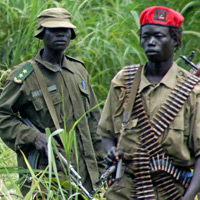
LRA leader Joseph Kony’s failure to sign a peace deal in April drove a nail into the coffin of the Juba peace process—a process that is grinding to an unsuccessful end. While the talks contributed to relative peace in northern Uganda, a lack of real leverage and a direct channel to Kony, have allowed the Kony to exploit this last year of negotiations to stave off international pressure, collect food and money from the mediators and donors, and buy time to abduct, train and equip new combatants.
With hopes of a peace agreement dashed by Kony’s intransigence, it is time for a new approach; talks must close, problems addressed, and a two-track strategy is now needed.
Urgent and Immediate Priorities
Two critical problems must be addressed now to salvage peace efforts in northern Uganda:
1. The lack of a channel to negotiate directly with Kony on the make or break issue: his security.
2. The lack of leverage for the peace process, which only the combination of the ICC indictments, a credible regional military threat, and a reduction of external support to the LRA, can provide.
Track 1: Assist the people of northern Uganda with rebuilding their lives
- The Ugandan government, backed by international donors, must implement its reconstruction and development plan for the North; this is a critical step towards restoring the confidence of the people in the North and encouraging them to return home.
- Ugandan security forces must provide protection in the North.
Track 2: Deal with Kony as a regional threat
With a new and largely impenetrable base in the Central African Republic, Kony poses an immediate threat to neighboring southern Sudan, northeastern Congo, and southeastern Central African Republic.
- The international community must prepare to implement a military strategy and should plan for operations to contain and ultimately apprehend Kony and other LRA leaders indicted by the ICC.
- The international community must sever support to the LRA by a small number of individuals in the Ugandan diaspora.
- Working with their respective peacekeeping missions, Congo, southern Sudan, and Central African Republic, must deploy forces to the areas where LRA are likely to attack.
- Backed by the leverage of military planning and investigations by the ICC, the U.S. and other key actors should quietly construct a channel to Kony that creates an exile option for him and the other indictees to an ICC non-signatory country.
Kony’s choices
Right now, Kony has three choices he can make about his future, and the Ugandan government and key international players must press him to choose:
- Sign the peace deal and begin assembling his LRA forces in Ri-Kwangba.
- Agree to a third country asylum arrangement representing exile or banishment from northern Uganda as a consequence for his crimes.
- Walk away from the agreement and formalize his status as a regional warlord which will almost certainly trigger a manhunt that could leave him on the run for the rest of his life. To bring an end to the LRA threat in northern Uganda and the surrounding region, the peace strategy must shift from one that relies solely on negotiations to one that develops leverage through military planning, presses Kony to make a choice about his future, and pushes forward a development and security strategy for northern Ugandans to return voluntarily, even in the absence of a peace deal. Otherwise, absent a concerted effort to address the regional threat that Kony now poses, no civilian within in a four-country radius can rest assured that they will not fall victim to the next LRA attack.

